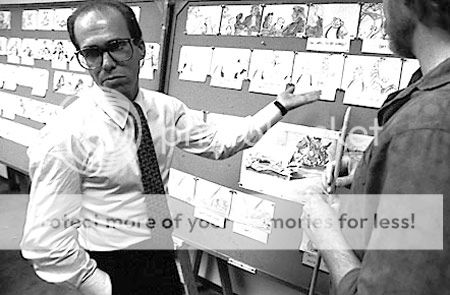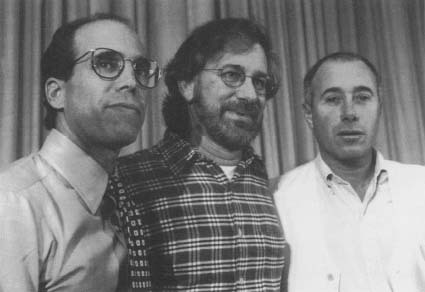Jeffrey Katzenberg’s BFI Keynote
If one of the biggest animation giants in the industry came to the UK to give a keynote speech, you’d expect Skwigly to be all over it, so naturally we were! Jeffrey Katzenberg was the keynote speaker at the London Film Festival at the BFI and it was truly fascinating to hear his insights into the world of animation, Dreamworks and his past experiences. And here’s what he had to say on pretty much everything:
On English Weather:
“Everyone needs to stop apologising for the weather. When we look up to the sky and we feel rain on our faces in California we say “Thank god!””
On his life mantra to “Exceed people’s expectations than him”:
Katzenberg said that when he got started in the industry he had such incredible mentors that were able to help him learn the industry and learn the methods to success. His most key values when starting out in the industry were to be on time, respect other people’s time and answer and return every phone call. He had such an anxiety to please people and that has stayed with him to day. He spoke of an anecdote where he had a job organising private screenings and he had to organise a screening for Robert Altman’s Nashville and he decided to hire a marching band to play the Nashville theme song for when the guests got off the plane. Altman described this as “going a bit too far” but that is Katzenberg’s mantra and one he has kept to this day. “I not only apply it to my work, I apply to life, to everything I do. But it’s my wife and I’s 40th wedding anniversary this year and I don’t know how to exceed expectations there.”
On life lessons:
“I don’t look back” said Katzenberg, “I never look back.” He stated that his greatest lessons all came from misses and failures, those films that didn’t work. “Dreamworks is a place where everyone has a right to fail” and by this Katzenberg meant that at Dreamworks there are no bad ideas, all ideas can be tossed around and developed to be better. “Few movies are perfect” he told, stating that he knows how hard it is to make “the perfect film”
On the company’s current financial issues:
“We had 17 hits out of 17 films over half a dozen years. It was unprecedented and then the last 2 out of 4 films didn’t do so well” whilst this is technically true, he may have undermined the failure he is still right in that Dreamworks still has a great legacy and a lot to be proud of. When speaking of those films specifically he said that the “Films didn’t put the company at risk, we just made adjustments” and that “We’ll still be around for a long time.”
On taking on projects and taking risks:
Katzenberg loves taking risks and that it’s his favourite part of taking on projects. Many people would say that creating a sequel would involve less risk however he stated that “How To Train Your Dragon 2 is one of the most ambitious and most creative films they’ve made in the last 20 years” and that the ambition to make bigger and better projects never dies no matter what the project is.
On making connections with emerging talent:
“It’s not my main job but it’s definitely something I take importantly” when talking about emerging talent. Katzenberg praised that “Dreamworks constantly embraces new talent” and that “Dreamworks is the place to nurture and grow new talent” and that it is “unique and different atmosphere.”
On equality and diversity:
Katzenberg was very quick (and rightly so) to boast that Dreamworks has 36 languages spoken and that they have staff from all over the world. “We have staff from all over the world and make films for all over the world.” And on the topic of women in the industry, Katzenberg promptly added that 3 out of the next 7 films will be directed women and that one of his most successful films (of which he clarified was Kung Fu Panda 2) was directed by a woman. And that a woman (Bonnie Arnold) will be producing almost all future films. He chuckled that women make better leaders in his opinion.
On initally joining Walt Disney:
“I hadn’t studied animation or analysed it at any point before joining the studio” after speaking about his live action background. In an anecdote, he recalled when Mike Eisner showed him the animation building and declared “This. This is your problem”. Of course Katzenberg felt very nervous about this. He later stated that when two young, naive storyboard artists presented him with a project he said he’d never even seen a storyboard before! But those two storyboard artists turned out to be John Musker and Ron Clements and the project was originally called Basil of Baker Street which turned into The Great Mouse Detective and it propelled their career. To help himself cope with the stresses of the job and see how he could cope he found Walt Disney’s archives and learnt and read through everything. He said “I was never around and working when Walt was but in a strange way, he was my biggest teacher.”
Katzenberg at Disney
On talent:
“For years Dreamworks has been the home of finding and nurturing new voice talent as well as collaborating with well established actors” Katzenberg bragged. He is proud to have established some of the well known talent we have today such as Chris Columbus and Peter Weir. He admitted that he is bias towards working with talent he’s worked with before and that he thrives on those continuing relationships. He summed it up by saying “Talent is everything. Talent is the beginning, middle and end.”
“I will never read that memo again. I don’t like to look back. It was before we even had internet! But that’s a tip, don’t write stuff down”
On creating Dreamworks:
“In 1994 Steven Spielberg had just won the Academy Award for ‘Schindler’s List’ and just released ‘Jurassic Park.’ David Geffen had just sold his record company for the third or fourth time for a couple of billion dollars. I was fired (from Disney), (given) the boot, out-the-door, ugly. The fact I was somehow able to convince these two geniuses that one third of me was worth as much as one third of Steven Spielberg and one third of David Geffen is one of the great hustles in humanity,” joked Katzenberg. “It was only eight days after I’d been fired (from Disney). I was too happy and too stupid to know how hard it was going to be.”
Katzenberg, Spielberg and Geffen
On making and rewatching films:
On taking us through the animation process he revealed just how intense it can be. “An animated film is made up of roughly 150,000 frames and each frame goes through 10 – 100 iterations so we’re possibly recreating up to 15 million frames!” On the topic of rewatching films he said “I’ve never watched a film I’ve made more than once. Once it’s finished, it’s finished. With one exception.” And that exception was Prince of Egypt when they were choosing whether or not to re-release it and so he gave it a second watch. And upon watching it again he realised something… “It’s so serious! Way too serious! Way too serious for animation! I love it! But damn, that’s some serious stuff.”
On 3D:
In 2009, Katzenberg said that 3D would utterly change the experience of watching films when he released Monsters vs Aliens and a lot of people were reluctant to agree. 5 years later he admits he was wrong. “You mean when they were right and I was wrong” Katzenberg laughed. “I honestly didn’t see it as a gimmick. I saw it as a new tool for storytellers who had the highest ambitions” which is understandable. “My heart beats quicker” on discussing films that fully utilise 3D such as Avatar and The Polar Express. But he understands and took a lot of responsibility for it’s unpopularity. “We lost the confidence and trust of the audience. And when you do that, it’s very hard to get it back” and that it’s hard when there are films that really do use 3D and that “great 3D must be told by critics and word of mouth” in order for people to actually watch them. He agreed that some Dreamworks films don’t utilise 3D in this same way and stated that he was “Disappointed he didn’t realise the full potential of 3D.”
On other technological advances:
“There’s no technical advances we should be looking for” he informed. Explaining that Dreamworks has done a lot for technical advancements but “at the end of the day it still all just comes down to having a good beginning, middle and end and that story comes first”.
On Chinese Dreamworks Expansion:
Katzenberg explained that there are over 200 artists contributing to Kung Fu Panda 3 and will continue to contribute to Dreamworks films in the future. Katzenberg also discussed the rise of the Chinese audience and how much it has grown and will continue to grow. He was pleased at how well China has embraced western culture. He declared “China will be the largest movie market in the world” and therefore they will also start making films for China. “Two future films are based on Chinese myth and legend. Similar to Walt’s take on European fairytales”
Could Dreamworks do to Chinese myth what Disney did to fairytales?
On the most beautiful thing:
At one point of the speech he asked us to close our eyes and think of the most beautiful thing in the world apart from a person. Katzenberg then spoke “My most beautiful thing in the world is laughter, in particular children’s laughter and so I have the best job in the world. I have the absolute best job in the world.”
On the future:
“I say with confidence, and hopefully no arrogance, I couldn’t be more certain my best years are still ahead of me,” he spoke. “I imagine what DreamWorks could be in 10, 20, 30 years from now. Stay tuned, there’s more to come.”
On Aardman:
Katzenberg closed the Keynote perfectly by stating:
“Some of the greatest years, the greatest laughs, the greatest projects were created with your own UK’s Aardman.”David Sproxton, Peter Lord, Mel Gibson, Nick Park & Jeffrey Katzenberg at an event for Chicken Run
The BFI London Film Festival 2014 runs until the 19th October. Find out more on the website here





